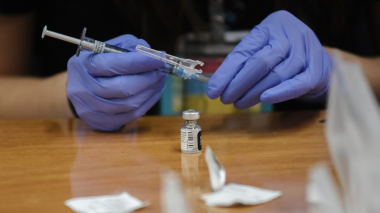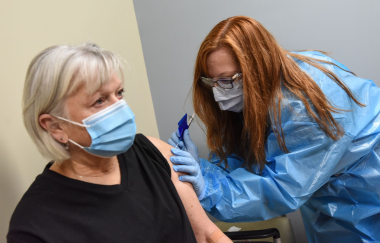Information current as of January 29, 2021
This information was reviewed for accuracy by Katie Passaretti, MD.
We couldn’t be happier to share the news that the COVID-19 vaccine is here. Within just a few days of its authorization by the U.S. Food and Drug Administration (FDA), Atrium Health’s frontline workers were among the first people in North Carolina to receive the first approved COVID-19 vaccine.
“This is a moment of hope, a moment of potential for change. I couldn’t be more excited, and I encourage everyone to consider getting vaccinated,” says Katie Passaretti, MD, Atrium Health's Medical Director of Infection Prevention and the first person in North Carolina to get the COVID-19 vaccine.
As the vaccine becomes more available and new ones are approved, we want to help you stay informed. How will vaccine distribution work? How will you and your family know when you’re eligible to receive it? We’ve heard questions from many patients who are eager to getthe vaccine and want to learn more. Here, we share information on what’s happening now, what’s happening next and how you can prepare.
VACCINE TIMELINE & PATIENT POPULATIONS
1) Who will get the COVID-19 vaccine first and how will everyone else be prioritized?
Atrium Health received our first vaccines on Monday, December 14, 2020 and receive more vaccines weekly. Who gets the vaccine first follows guidance from Centers for Disease Control and Prevention (CDC) and the state.
To learn more about North Carolina’s vaccine distribution phases, visit covid19.ncdhhs.gov/vaccines.
For more information on how to register to receive the vaccine and schedule an appointment when it’s your turn, visit AtriumHealth.org/COVID19Vaccine
2) Who will get the COVID-19 vaccine first?
Who gets the vaccine first follows guidance from Centers for Disease Control and Prevention (CDC) and the state.
- Group 1 for the vaccineincludes healthcare workers, as well as long-term care residents and staff.
- Starting in early 2021, Group 2 includes patients ages 65 and older.
3) How will everyone else be prioritized?
After Phases 1 and 2 are done, the vaccine will be given out in 3 other phases to groups. These groups are grouped based on theirrisk level.
Phase 3:
- Frontline essential workers.
Phase 4:
- Adults as high risk for exposure and increased risk of severe illness.
Phase 5:
- Anyone else who chooses to get the COVID-19 vaccine.
As we enter each new phase, people from the previous phases can still get the COVID-19 vaccine. To see a more detailed list of who’s included in each phase, visit North Carolina Department of Health and Human Services.
4) Can children get the COVID-19 vaccine?
Not all vaccines have been tested in kids. Right now, there’s not a vaccine approved for children younger than 16.Children typically have a lower risk of COVID-19 complications and spreading the virus. Because of this, we are giving the vaccine to adults who are a higher risk of getting or spreading COVID-19.
“That’s pretty routine for vaccine studies to start out in the adult population and then move down sort of in a graded fashion to younger and younger children,” says Amina Ahmed, MD, epidemiologist and pediatric infectious disease expert at Atrium Health Levine Children’s.
5) If I’m pregnant or breastfeeding, should I getthe COVID-19 vaccine?
Talk with your doctor to learn if this vaccine is the best choice for you. While pregnant women have a higher risk of complications with COVID-19, not all COVID-19 vaccines have been studied in pregnant women. To learn more about the safety of this vaccine – as well other COVID-19 vaccines in development – for women who are pregnant or breastfeeding, please see our blog on pregnancy and the COVID-19 vaccine.
6) Should immunocompromised patients getthe COVID-19 vaccine?
People who have compromised immune systems (low defenses) should consider the vaccine. There is no research to show that the vaccine is a risk for these groups. Please talk to your doctor about your health concerns.
ABOUT THE VACCINE AT ATRIUM HEALTH
7) How can I schedule an appointment to get a COVID-19 vaccine?
We will let our patients know when they’re eligible to get the vaccine. We'll use MyAtriumHealth to let you know when you're eligible and to schedule your appointment. This allows patients to get notifications and schedule appointments online. If you’re an Atrium Health patient, we encourage you to create a MyAtriumHealth account now. This way, when it’s your turn to get the vaccine, we can send you quick messages. It’s also an easier way to schedule your appointment.
More information on scheduling your appointment can be found at AtriumHealth.org/COVID19Vaccine.
8) How will the vaccine be given?
The COVID-19 vaccine is given in a series of 2 shots of the same vaccine, given a few weeks apart. As with all appointments at Atrium Health, these vaccines will be given in COVID-Safe places. We will ensure social distancing and have proper personal protective equipment (PPE) forall patients and staff.
9) If I have questions about the vaccine and my health, whom should I contact?
Please contact your doctor if you have questions about how your health history or conditions may affect your eligibility for the vaccine.
10) What is Atrium Health’s role in COVID-19 vaccine research?
We remain committed to research that will ultimately provide safe and effective vaccine options for our patient population and community. We expect to open a phase 3 clinical trial of another COVID-19 vaccine. This will give even more opportunities for our patients to have access to another possible FDA-approved vaccine.
Interested in helping? You can join our COVID-19 vaccine research registry. Sign up now.
ABOUT THE VACCINE
11) How much does the vaccine cost?
There is no charge to you to get the vaccine:
- If you have insurance, the administration fee will be paid by your insurance with no cost to you.
- If you do not have insurance, the fee can be paid for by the Provider Relief Fund with no cost to you.
12) The COVID-19 vaccine was approved more quickly than other vaccines. Is it safe?
We understand your concerns, and we reassure you that all COVID-19 vaccineshave been thoroughly tested. No steps were skipped during the research and approval processes. They have been authorized for public use by the U.S. Food and Drug Administration. And COVID-19 vaccination is recommended by Centers for Disease Control and Prevention (CDC).
13) Does it matter which COVID-19 vaccine I get?
All approved COVID-19 vaccines are highly effective. Although you can’t choose which one you get, rest assured you’re getting great protection against COVID-19.
14) How long will it take for the vaccine to protect me against COVID-19?
Researchers believe that people begin to become immune to COVID-19 within a week or 2 of their final dose.
15) Will I need to get the COVID-19 vaccine every year?
That’s uncertain at this time. Researchers are still studying whether getting the vaccine again in the future will be needed. And if so, how often they will be needed.
16) Will the vaccine give me COVID-19?
No. A vaccine will not infect you with the illness that it’s created to prevent. The goal of this vaccine is to teach your immune system to recognize and to fight the virus that causes COVID-19. You may have minor side effects after your vaccine appointments. This includes:
- Pain or swelling at the site of the shot
- Fever
- Chills
- Tiredness and headache, especially after the final dose(but those should only last a day or two)
The risks of these side effects are much less serious than the risks you would face if you caught COVID-19 or the risks our community would face if the virus continued its spread.
17) If I’ve already had COVID-19, will I still need to get the vaccine?
Yes. Some people who have had COVID-19 still don’t have antibodies to fight the virus. Even having COVID-19 antibodies may not mean total immunity from the virus. By getting this vaccine, you can develop the protection you need against COVID-19.
18) After I get the vaccine, can I stop wearing my mask or social distancing?
No. For now, even if you get the vaccine, wear your mask and keep your distance. While the vaccine can teach the body to fight the symptoms of the virus, it’s possible that someone who’s taken the vaccine could still spread the virus to others. This is even while they feel perfectly healthy.
Also, governors can require mask wearing in public, so please follow your state’s rules. In North Carolina, current laws require the use of masks in public.
19) Will I need both a flu vaccine and a COVID-19 vaccine?
Yes. These vaccines fight against 2 different viruses, so it’s important to get both. Depending on future research, we may need to get both vaccines each year to keep ourselves and our communities safe.
20) Should when I get the COVID-19 vaccine affect when I get my other vaccines?
Yes. Researchers recommend that you don’t get any other vaccines within a 2-week window either before or after your COVID-19 vaccine.
21) Should adult patients who are awaiting transplants or adult patients who have just received a transplant get the COVID-19 vaccine?
If you are a candidate for transplant or have recently received a transplant, speak with your care team to determine if this vaccine is the best choice for you.
“Available data suggests that transplant recipients have a higher risk of contracting COVID-19 because they have compromised immune systems. In general, we recommend transplant recipients who are more than three months out from their transplant receive the vaccine,” said Theodore Frank, MD, FACC, cardiologist and heart failure specialist at Atrium Health Sanger Heart & Vascular Institute. “We also recommend that caregivers of transplant patients get vaccinated. If you have questions about when to schedule your vaccine, work closely with your medical care team to consider your options.”
ABOUT THE SECOND DOSE OF THE VACCINE
22) What should I expect after I get the second dose of the COVID-19 vaccine?
It is common with many vaccines to have side effects, such as:
- Headache
- Fever
- Fatigue (feeling very tired)
- Muscle aches
- Pain at the injection site
After getting the second dose of your COVID-19 vaccine, you may have similar side effects to those you had with the first dose. However, they may be worse. Side effects should go away after 48 to 72 hours.
“While not everyone has side effects after getting the vaccine, many will. This can be a sign that your immune system is working to protect you. You will probably feel more side effects after the second dose, compared to the first dose. This is especially in people who are between the ages of 25 to 55,” said Katie Passaretti, MD, medical director of Infection Prevention at Atrium Health.“When planning for your second dose, try to get it on an easy day. Or take time off from work the day after you get it.”
23) Why is it so important to get the second dose?
Getting both doses of the COVID-19 vaccines is important to making sure your body is fully protected against COVID-19.
“While there is some protection that starts a week after the first dose, the second dose is needed to make sure you get the most protection against COVID-19. Getting the second dose makes your immune system stronger if you are later exposed to COVID-19,” said Passaretti.
24) Is there a time limit for getting the second dose to make sure it will work?
Per the CDC (Centers for Disease Control and Prevention), patients should get their second shot as close to the timeline recommended. This is:
- Three weeks after for the Pfizer vaccine or
- One month after for the Moderna vaccine
If you are unable to get your second shot within the recommended timeline, schedule it as soon as you can.
25) What happens if I can’t get the second dose within the preferred timeline?
You should still get the second vaccine when you are able to.
“We do not recommend getting an extra dose in addition to the second shot if you missed it. Redoing the vaccine series after you get your first dose has not been studied. Sowe don’t know how an extra dose will help protect you from COVID-19,” said Passaretti.
26) Where can I get more information?
- COVID-19 Resource Center: Visit our site to learn where to get tested, how to protect yourself and where to access care – as well as news and updates on research and vaccines.
- MyAtriumHealth: If you’re an Atrium Health patient, make sure you have an account with up-to-date contact information for easy communication with your providers and to get any messages when you’re eligible to get the vaccine.
- Your doctor: As always, we’re here for you. If you have concerns about your health or ifthe vaccine is right for you, please talk to your doctor.
- For more information on how to register to receive the vaccine and schedule an appointment when it’s your turn, visit AtriumHealth.org/COVID19Vaccine
National and state resources:
- Centers for Disease Control and Prevention (CDC)
- NC Department of Health and Human Services
- SC Department of Health and Environmental Control
- GA Department of Public Health



